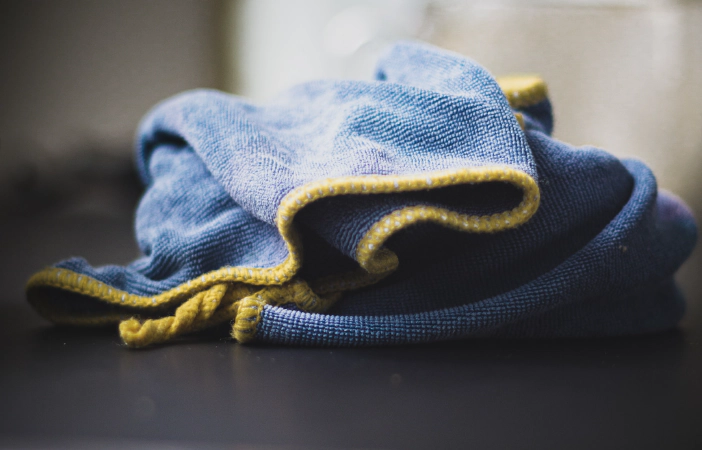
Cleaning an outdoor kitchen sounds like it’ll be a daunting task, but fear not! It’s not that bad.
In this post, I will show you exactly how to clean an outdoor kitchen, so you can keep it looking spotless and ready for your next BBQ party.
From tackling grease and grime to getting your appliances in tip-top shape, I’ve got you covered with all the tips and tricks you need.
So let’s jump right in and get your outdoor kitchen sparkling clean in no time!
Cleaning Stainless Steel Surfaces
Stainless steel surfaces can add a sleek and modern touch to your outdoor kitchen. However, they are notorious for showing every smudge and fingerprint.
But fear not! Cleaning stainless steel surfaces is easier than you might think.
First, start by removing any loose debris or food particles with a soft cloth or sponge. Then, mix a solution of warm water and mild dish soap.
Dip a non-abrasive sponge or cloth into the soapy water and gently scrub the surface in a circular motion.
For tougher stains or fingerprints, you can use a stainless steel cleaner or polish. Apply the cleaner directly to a cloth and rub it onto the surface, following the grain of the steel.
Be sure to rinse the surface thoroughly with clean water and dry it with a microfiber cloth to prevent water spots.
Remember, when cleaning stainless steel surfaces, avoid using abrasive cleaners or scrub brushes as they can scratch the steel. Also, steer clear of bleach or ammonia-based cleaners, as they can cause damage.
By following these simple steps, you can keep your stainless steel surfaces looking shiny and spotless, adding a touch of elegance to your outdoor kitchen.
Removing Grease and Grime
Let’s face it, outdoor cooking can get messy. Grease splatters and food residue can quickly build up on your outdoor kitchen surfaces.
But don’t worry, I’ve got some handy tips to help you remove grease and grime with ease.
First, start by wiping away any loose debris or food particles with a paper towel or a damp cloth. Then, take a mixture of warm water and dish soap and apply it to the greasy areas.
Let it sit for a few minutes to loosen up the grease.
Next, grab a scrub brush or a sponge with a non-abrasive surface and gently scrub the greasy spots. Make sure to use a circular motion to effectively remove the grease.
For stubborn grease stains, you can use a degreasing agent or a vinegar solution.
If you’re dealing with a particularly stubborn area, baking soda can be your secret weapon. Create a paste by mixing baking soda with water and apply it to the greasy spot.
Let it sit for a few minutes, then scrub it away with your sponge or brush.
After removing the grease and grime, rinse the surface thoroughly with clean water. Wipe it dry with a clean cloth or a microfiber towel to prevent any water spots from forming.
Remember, prevention is key to keeping grease and grime at bay. Regularly cleaning your outdoor kitchen after each use can help prevent buildup and make your future cleaning sessions a breeze.
So, don’t let grease and grime discourage you from enjoying your outdoor cooking adventures. With these simple techniques, you can keep your outdoor kitchen surfaces clean and ready for your next delicious meal.
Cleaning the Grill
Ah, the grill – the centerpiece of any outdoor kitchen. After all those sizzling burgers and juicy steaks, it’s time to give your grill a good cleaning.
Don’t worry, I’ve got some practical tips to help you get it done efficiently.
Start by letting the grill cool down completely. It’s essential to work with a cool grill to avoid injury.
Once it’s cooled, remove the grates and set them aside for cleaning.
For gas grills, disconnect the gas and remove the gas burners. Scrub the burners with a grill brush to remove any debris or grease buildup.
If there are stubborn stains, you can soak them in warm soapy water before scrubbing.
Now, let’s move on to the grates. They can be a magnet for grease and food residue.
Brush them with a grill brush to remove any excess debris. For a deeper clean, you can soak them in warm soapy water for a few minutes.
Then, scrub the grates to remove any stubborn residue. Rinse them thoroughly and dry them before putting them back in the grill.
Charcoal grills require a slightly different approach. First, remove any leftover ash from the grill.
Then, use a grill brush to clean the grates and remove any residue. If there’s excessive grease, you can use warm soapy water or a vinegar solution to soak the grates before scrubbing them.
Rinse them well and let them dry before reassembling the grill.
Don’t forget to wipe down the exterior of the grill. Use a damp cloth or sponge to remove any grime or grease.
For stainless steel exteriors, you can use a stainless steel cleaner to keep them looking shiny and polished.
By regularly cleaning your grill, you’ll not only keep it looking great but also ensure its longevity. A clean grill performs better and reduces the risk of flare-ups and food contamination.
Now that you know how to clean your grill, it’s time to fire it up again and enjoy some mouthwatering grilled goodness!
Maintaining Outdoor Kitchen Appliances
Outdoor kitchen appliances are an investment, and proper maintenance is crucial to keep them in top-notch condition. Here are some practical tips to help you maintain your outdoor kitchen appliances and ensure they last for years to come.
First and foremost, read the manufacturer’s instructions for each appliance. They will provide specific guidelines on cleaning and maintenance, tailored to your specific model.
Regularly inspect your appliances for any signs of wear or damage. Check for loose connections, worn-out seals, or rust.
Address any issues promptly to prevent further damage.
Keep your appliances clean by wiping them down after each use. Use a mild dish soap and warm water to gently clean the surfaces.
For stainless steel appliances, you can use a stainless steel cleaner to retain their shine.
For grills and smokers, regularly clean the drip trays and grease pans to prevent grease buildup, which can be a fire hazard. Empty and clean these components according to the manufacturer’s instructions.
Ensure proper ventilation for your outdoor kitchen appliances. Adequate airflow is essential for optimal performance and preventing overheating.
Clear any debris or obstructions from vents or exhaust systems.
Protect your appliances from the elements. Use covers specifically designed for outdoor kitchen appliances when they’re not in use.
This will shield them from sun, rain, and other weather conditions that could cause damage.
Schedule routine maintenance checks for your appliances. Consult a professional if needed to perform servicing and inspections.
They can fine-tune the appliances, check for any potential issues, and keep them running smoothly.
Lastly, use your appliances regularly. Regular usage keeps them in better condition and minimizes the risk of mechanical issues due to extended periods of inactivity.
By keeping on top of this stuff, you can ensure that your outdoor kitchen appliances continue to serve you well, providing delicious meals and unforgettable memories for years to come.
